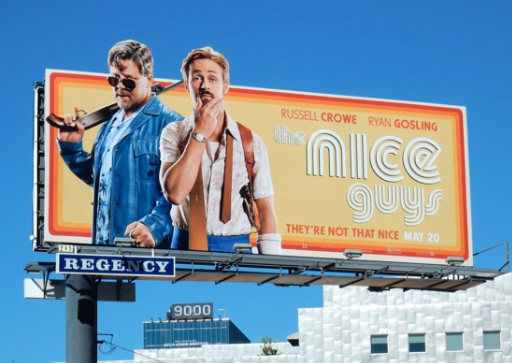When it comes to Shane Black, the singular style of his detective movies has only grown in confidence and wit with each new screenplay he pens. Or types. Though it’s been just over ten years since 2005’s Kiss Kiss Bang Bang–a film that proved Black not only knows Hollywood inside and out, but also knows just how to make fun of it in all the most button-pushing ways–The Nice Guys feels like something of an immediate prequel to it. And though Iron Man 3 and Edge in between have showcased the financial reasons for why he writes movies, it is a screenplay like The Nice Guys that truly highlights what Black is in the business for: to prove that a narrative and its dialogue can be intelligent and still go through the studio system (or what’s left of it).
Set in the Los Angeles of 1977, Black is in his element as he opens on a young, blossomingly sexually charged preadolescent sneaking a porno mag out of what we can only assume is his father’s room. The woman he’s lusting after: Misty Mountains (Murielle Telio). But before he can give her the proper amount of salivation, her car barrels right through his house. As he goes to see the body, his astonishment at the sight of Mountains’ signature mountains is further accented when she asks, “How do you like my car, big boy?” With that, she dies with bloodied sex appeal. But, just as it is with Kiss Kiss Bang Bang, this seemingly unrelated incident is directly related to Holland March’s current search for a girl named Amelia Kutner (Margaret Qualley), a smog protester/porn dabbler who seems to hold the key to Misty Mountains’ death. On a side note: the smog factor is integral to getting a snapshot of what L.A. was all about at the time–having the best, flashiest cars straight from Motor City (oil crisis/OPEC price wars be damned!).
Constantly there to help him whether he wants it or not is his daughter, Holly March (Angourie Rice), a precocious thirteen-year-old who also seems to serve as Holland’s constant designated driver. When Amelia hires another private detective, Jackson Healy (Russell Crowe), to throw two other private detectives (it’s all very involved, per the usual rules of Shane Black cinema) off the scent of her trail, Healy instead goes for March, breaking his arm–or rather, “dislocating” it–and telling him to stop looking for Amelia, as these are her wishes. When the same two guys on the hunt for Amelia, known, for various reasons you’ll understand upon seeing the film, as Older Guy (Keith David) and Blue Face (Beau Knapp), come searching for Healy at his apartment, Healy changes his tune and suddenly wants to help March find her because, as he says, he “like(s) where [he] lives.”
The duo, paired with Holly, turns out to work surprisingly well together, with March serving as the drunk, but deft clue-finder and Healy as the muscle with no mercy. To heighten the sense of grit, Black even re-teams Kim Basinger (as Judith Kutner, Amelia’s mother and the head of the Department of Justice) with Crowe for an effect that naturally conjures images of another instant classic of a City of Angels-based detective story, L.A. Confidential.
Black’s nuanced attention to detail is present in every frame, including shots of Sunset Boulevard featuring Tower Records during its glory days and The Comedy Store with Robert Klein, Tim Allen and Richard Lewis as the lead comics on the bill. To be sure, the message Black wants to convey is specific to the 70s, yet remains pertinent to the issues of now–mainly, that “the people in charge” never seem to get their comeuppance, even when one catches them red-handed. This is a theme Gosling also appears to be fond of when considering his last film was The Big Short. Except, in the case of The Nice Guys, snappy dialogue is equally as tempered by non-stop action sequences that even top the ones carried out by Harry Lockhart (Robert Downey Jr.) in Kiss Kiss Bang Bang. And so, with the help of co-writer Anthony Bagarozzi, Black has managed to one-up his most “L.A.” movie to date. And it doesn’t hurt that Gosling gets a scene on the toilet.




















